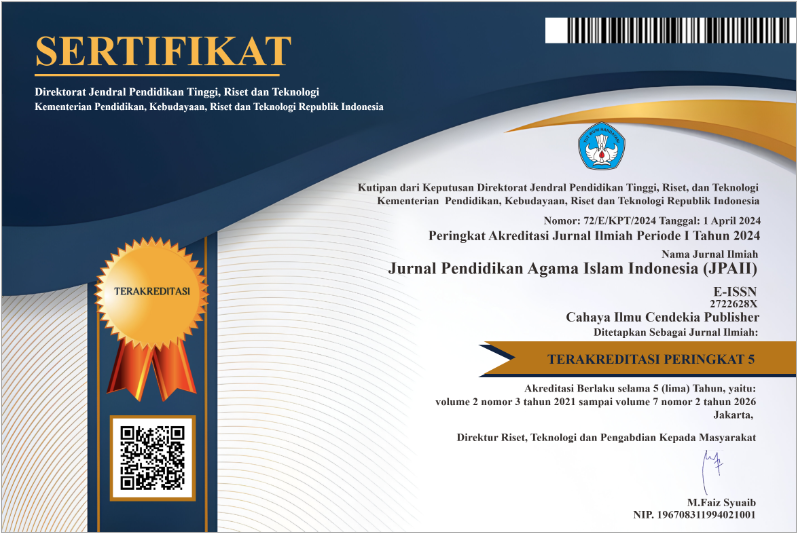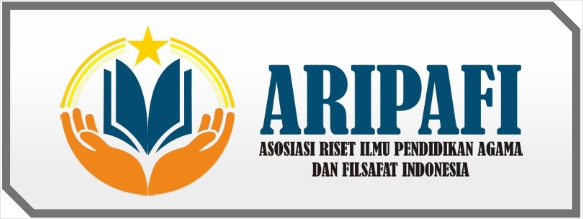The Relationship between Self-Concept and Self-Confidence in Islamic Religious Education Study Program Students
Abstract
Purpose of the study: This research aims to determine the relationship between self-concept and self-confidence of students in the Islamic Religious Education Study Program.
Methodology: The data collection used was a quantitative approach, which was carried out using a questionnaire method which was distributed to 75 respondents. Then to find out the relationship between variables X and Variable Y, use Product Moment.
Main Findings: The results of the research analysis show that there is a positive and significant relationship between self-concept and self-confidence of students in the Islamic Religious Education Study Program, this is proven by the results ro of 0.234 which is consulted with the r table value at a good error level of 1% (0.296) or 5% (0.227) which means ro is greater than or equal to r table.
Novelty/Originality of this study: This study highlights the importance of self-concept in building the self-confidence of Islamic Religious Education students, offering new insights for educators to develop more effective teaching strategies.
References
A. Rohaeni, I. Wasliman, D. Rostini, and Y. Iriantara, “Management of Noble Moral Education for Madrasah Aliyah Students at Persatuan Islam Boarding School,” J. Ind. Eng. Manag. Res., vol. 2, no. 4, pp. 154–171, 2021.
L. W. Yang, P. Aggarwal, and A. L. McGill, “The 3 C’s of anthropomorphism: Connection, comprehension, and competition,” Consum. Psychol. Rev., vol. 3, no. 1, pp. 3–19, 2020, doi: 10.1002/arcp.1054.
L. Lubis, . A., and E. Fazira, “Connection Management Self-Concept and Social Support With Student Confidence,” Nidhomul Haq J. Manaj. Pendidik. Islam, vol. 7, no. 1, pp. 31–38, 2022, doi: 10.31538/ndh.v7i1.1890.
F. D. Pratiwi and F. Mangunsong, “Social support impact on academic self-concept of students with special needs,” Electron. J. Res. Educ. Psychol., vol. 18, no. 50, pp. 143–158, 2020, doi: 10.25115/EJREP.V18I50.2404.
H. Yusuf, M. Syah, M. A. Ramdhani, and A. Hasanah, “The Effect of Interpersonal Communication and Teacher Competence on the Quality of Character Education and Student Learning Achievement,” Int. J. Nusant. Islam, vol. 8, no. 2, pp. 313–322, 2020, doi: 10.15575/ijni.v8i2.12663.
U. Raihani et al., “Identification of Factors Affecting Student Self-Confidence in the Alpha (Digital) Generation,” in BICC Proceedings, 2023, vol. 1, pp. 104–112, doi: 10.30983/bicc.v1i1.35.
J. J. Gladstone, J. M. Jachimowicz, A. E. Greenberg, and A. D. Galinsky, “Financial shame spirals: How shame intensifies financial hardship,” Organ. Behav. Hum. Decis. Process., vol. 167, no. December 2019, pp. 42–56, 2021, doi: 10.1016/j.obhdp.2021.06.002.
B. Shahar, “New developments in emotion-focused therapy for social anxiety disorder,” J. Clin. Med., vol. 9, no. 9, pp. 1–15, 2020, doi: 10.3390/jcm9092918.
Muamaroh, N. Hidayat, and S. Lestari, “Tertiary students’ anxiety in speaking English,” English Linguist. Lit. Lang. Teach. a Chang. Era, vol. 1, no. 1, pp. 193–198, 2020, doi: 10.1201/9780429021039-26.
S. M. Lukman, A. M. Yusuf, Y. Syukur, and Nurfarhanah, “The Relationship Of Physical Self-Concept And Parent,” IJERLAS Int. J. Educ. Rev. Law Soc. Sci., vol. 2, no. 6, pp. 867–876, 2022.
M. Criticos, T. Layne, K. Simonton, and C. Irwin, “Gender differences with anxiety, perceived competence, and grit in collegiate track and field throwers,” J. Phys. Educ. Sport, vol. 20, no. 5, pp. 2751–2759, 2020, doi: 10.7752/jpes.2020.05374.
R. G. Berondo, “Self-Confidence, Readiness for Leadership Role, Work Commitment and Elementary Teachers’ Performance in Panay Island,” J. World Englishes Educ. Pract., vol. 2, no. 2, pp. 169–186, 2020.
J. A. M. Miranda and A. Y. Wahyudin, “Pre-Service Teachers’ Strategies in Improving Students’ Speaking Skilss,” J. English Lang. Teach. Learn., vol. 4, no. 1, pp. 40–47, 2023, [Online]. Available: http://jim.teknokrat.ac.id/index.php/english-language-teaching/index.
Z. Rao and H. Chen, “Teachers’ perceptions of difficulties in team teaching between local- and native-English-speaking teachers in EFL teaching,” J. Multiling. Multicult. Dev., vol. 41, no. 4, pp. 333–347, 2020, doi: 10.1080/01434632.2019.1620753.
M. T. Tatto, “Professionalism in teaching and the role of teacher education,” Eur. J. Teach. Educ., vol. 44, no. 1, pp. 20–44, 2021, doi: 10.1080/02619768.2020.1849130.
Farihin, Suteja, Muslihudin, Aris, A. A. Haqq, and W. Winarso, “International Journal of Educational Methodology A Skill Application Model to Improve Teacher Competence and Professionalism,” Int. J. Educ. Methodol., vol. 8, no. 2, pp. 331–346, 2022.
E. T. Agustina, A. Y. Wahyudin, and A. A. Pratiwi, “the Students’ Motivation and Academic Achievement At Tertiary Level: a Correlational Study,” J. Arts Educ., vol. 1, no. 1, pp. 29–38, 2021, doi: 10.33365/jae.v1i1.33.
S. Gultom and L. Oktaviani, “the Correlation Between Students’ Self-Esteem and Their English Proficiency Test Result,” J. English Lang. Teach. Learn., vol. 3, no. 2, pp. 52–57, 2022, doi: 10.33365/jeltl.v3i2.2211.
A. Juwaini et al., “The role of customer e-trust, customer e-service quality and customer e-satisfaction on customer e-loyalty,” Int. J. Data Netw. Sci., vol. 6, no. 2, pp. 477–486, 2022, doi: 10.5267/j.ijdns.2021.12.006.
X. Geng, G. Dong, Z. Xia, and H. Liu, “SAR Target Recognition via Random Sampling Combination in Open-World Environments,” IEEE J. Sel. Top. Appl. Earth Obs. Remote Sens., vol. 16, pp. 331–343, 2023, doi: 10.1109/JSTARS.2022.3225882.
M. S. Mahmud, J. Z. Huang, S. Salloum, T. Z. Emara, and K. Sadatdiynov, “A survey of data partitioning and sampling methods to support big data analysis,” Big Data Min. Anal., vol. 3, no. 2, pp. 85–101, 2020, doi: 10.26599/BDMA.2019.9020015.
G. Guest, E. Namey, and M. Chen, “A simple method to assess and report thematic saturation in qualitative research,” PLoS One, vol. 15, no. 5, pp. 1–17, 2020, doi: 10.1371/journal.pone.0232076.
R. Lumbantobing, “The Relationship between Alexitymia and Emotional Intelligence,” in 1st International Conference on Education, Society, Economy, Humanity and Environment (ICESHE 2019), 2020, vol. 6, no. 11, pp. 69–74, doi: 10.5539/ass.v6n11p166.
H. Mulang and A. H. P. K. Putra, “Exploring the Implementation of Ethical and Spiritual Values in High School Education: A Case Study in Makassar, Indonesia,” Golden Ratio Soc. Sci. Educ., vol. 3, no. 1, pp. 01–13, 2023, doi: 10.52970/grsse.v3i1.105.
J. Mata-McMahon, M. J. Haslip, and D. L. Schein, “Connections, Virtues, and Meaning-Making: How Early Childhood Educators Describe Children’s Spirituality,” Early Child. Educ. J., vol. 48, no. 5, pp. 657–669, 2020, doi: 10.1007/s10643-020-01026-8.
A. Agustanti and K. Astuti, “Relationship Between Social Skills and Social Support with Peers’ Academic Confidence on Boarding High School Students,” J. Int. Dakwah Commun., vol. 2, no. 2, pp. 97–110, 2022, doi: 10.55849/jidc.v2i2.201.
M. Jerald and V. Honey Me, “Number Of Friends In School And The Level Of Self-Confidence Of The Students,” Int. J. Res. -GRANTHAALAYAH, vol. 8, no. 1, pp. 277–286, 2020, doi: 10.29121/granthaalayah.v8.i1.2020.282.
I. Ismail, H. Ali, and K. Anwar Us, “Factors Affecting Critical and Holistic Thinking in Islamic Education in Indonesia: Self-Concept, System, Tradition, Culture. (Literature Review of Islamic Education Management),” Dinasti Int. J. Manag. Sci., vol. 3, no. 3, pp. 407–437, 2022, doi: 10.31933/dijms.v3i3.1088.
H. Fakhrurrozi, M. Minabari, F. Saguni, and S. Nadirah, “Integration of Islamic Education Curriculum to Enhance the Social Character of Vocational High School Students,” Ta’dib, vol. 26, no. 1, p. 171, 2023, doi: 10.31958/jt.v26i1.7237.
S. S. Dewi, Sutrisno, and A. Madjid, “The Interconnectedness Of Religiosity And Teachers ’ Efficacy In The Character Education In Indonesian Islamic Integrated School,” Eur. J. Soc. Sci., vol. 5, no. 3, pp. 131–146, 2020, doi: 10.46827/ejsss.v5i3.877.
Copyright (c) 2024 Khoiri Azizi, Sulayman Adeniran Shittu, Ahmad Ghiyats Fawwaz

This work is licensed under a Creative Commons Attribution 4.0 International License.
Authors who publish with this journal agree to the following terms:
- Authors retain copyright and acknowledge that the Jurnal Pendidikan Agama Islam Indonesia (JPAII) is the first publisher licensed under a Creative Commons Attribution 4.0 International License.
- Authors are able to enter into separate, additional contractual arrangements for the non-exclusive distribution of the journal's published version of the work (e.g., post it to an institutional repository or publish it in a book), with an acknowledgment of its initial publication in this journal.
- Authors are permitted and encouraged to post their work online (e.g., in institutional repositories or on their website) prior to and during the submission process, as it can lead to productive exchanges and earlier and greater citation of published work.







.png)
.png)





















